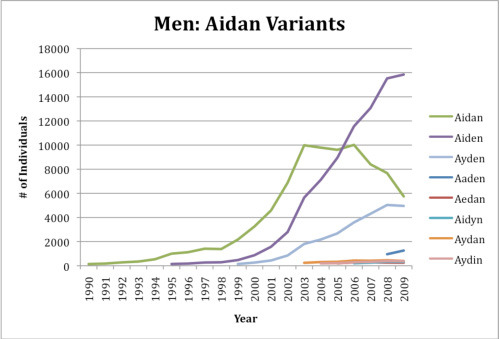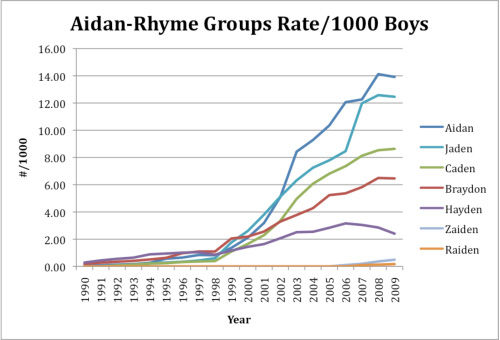
Main Menu - Misc. - Clothing/Textiles - Medieval Wales - Names - Other Medieval - Publications - Harpy Publications
Part II: The diverse roots of the Aidan-Rhyme names
Part III: Near-rhymes and predictions for new candidates for popularity
For all that baby name resources make a big deal out of the origins and meanings of names, it can’t be denied that many names are chosen more for the sound than the specific origin. Oh, parents may deny that’s what they’re doing, and individual names are always chosen partly for individual reasons, but an underlying truth comes out in the statistics. Certain sounds, sound-patterns, and spellings show the same overall fashions and falls from grace that names themselves do. A particularly striking case currently is that of names rhyming with Aidan. (This essay deals primarily with boys' names. Unless gender is specifically discussed, assume that all statements apply only to the masculine version.)
Although much of the point of this essay is that the fad for Aidan-rhymes is independent of the specific names involved, let’s start by looking at the history of that name.
Once upon a time, there was an Irish masculine given name Aodhán. (It comes from the root aodh meaning “fire” – which is often the meaning listed in baby-name books for variants of this name. In fact, Aodh itself is also an Irish masculine given name, but it didn’t emigrate quite as readily.) Now back in the very early middle ages, this name was written Aedán and pronounced roughly something like AY-than. And – it being the middle ages – a lot of the time people wrote the name down in Latin, changing it to fit the rules of Latin spelling, where it became Aidan(us). This is important, because when the name was revived much later outside Ireland, people often encountered it in the Latin form and used that spelling as a starting point.
Time passed, and the spelling of the Irish name shifted to Aedhán and then to Aodhán, and the pronunciation also shifted to something more like AY-yan (as you can hear in the surname "MacKeane" or "MacKane" which derives from this given name).
Now we need to skip to more modern times and a new interest in older Irish names and in “Celtic” names in general. (I may do an essay on the topic of “Celtic” names sometime in the future.) For a variety of reasons (and we could speculate on a few of them) the most popular spelling of the name in its revival was “Aidan”, taken from the Latinized form, which modern English speakers naturally pronounced as if it were an English name with that spelling – i.e., as “AY-dan”. The name first became re-popularized in Ireland, and in the British Isles more generally, starting around 1900 (see the Wikipedia article on the name for a selection of examples) but I'm interested specifically in the fate of the name in the USA.
In studying name trends in the U.S., I've made heavy use of two invaluable resources: the Social Security Administration registration data and the Babyname Wizard site which processes this data in various useful ways. (I'm also using a database based on the SSA data that I set up when working on Baby Names for Dummies that enables me to pull together the various spellings of the same root name, or names matching a particular pattern, or various other topics of interest.)
Aidan first becomes visible on the SSA charts in 1990 at #889 (0.3 out of every 1000 boys). It creeps up in popularity slowly at first, joined in 1995 by the spelling Aiden. But then something happens in 1998: both Aidan and the group of names as a whole start more than doubling in popularity every two years. New spelling variants start appearing more often: Ayden in 1999, Aden in 2000, Aydan in 2003, Aydin in 2004, Adin and Aedan in 2005. (There’s also the name Adan which had been showing up sporadically since the early 20th century. It isn’t technically a variant of Aidan, but it seems to have hitched a ride on the popularity boost in the last couple of years as a sound-alike.) By 2005, Aidan and Aiden are both in the mid 40s in the rankings, and the whole group of spellings put together are given to 11.7 boys out of every 1000.

But this isn’t where the story ends. If you look at the last few years of popular boys’ names, you start noticing an increasing number of names moving up the charts that rhyme with Aidan, even though they’re completely unrelated in origin. In addition to Aidan (if we’re including Adan in that group), we find Caden, Braydon, Hayden, Jaden (all in a variety of spellings) -- and when I first started writing this article in 2006 I came up with a list of other possible rhymes, of which Raiden and Zayden/Zaiden have now also made the charts. If you look at the rise in popularity of these name groups over time, they all show a startlingly simultaneous and steady rise in popularity starting in 1999.
Here's the rise of these name-groups (where all spellings for a particular sound are added together).

While newcomers like Raiden and Zayden may well be inventions driven solely by the fashion for this rhyme-group, the other names all have independent origins -- often several different origins, bound only by a similarity of sound. We've discussed the origins of Aidan, so let's look at the other groups in detail, in decreasing order of popularity.
Continue to In Aid of Aidan: Part II - The diverse roots of the Aidan-Rhyme names
Return to Index of Name Essays
This site belongs to Heather Rose Jones. Contact me regarding anything beyond personal, individual use of this material.
Unless otherwise noted, all contents are copyright by Heather Rose Jones, all rights reserved.